March
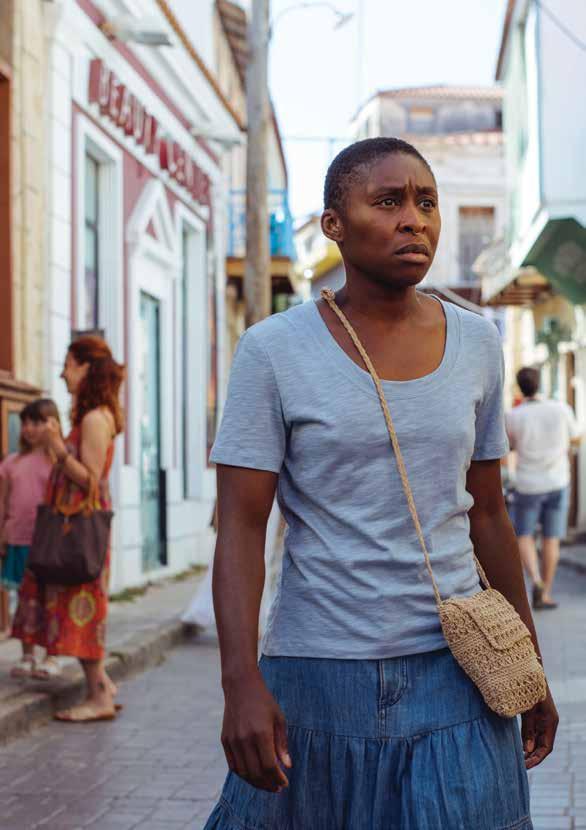

25-28
Mix tnbfc.co.uk
2024
Rich
XPOSÉ

You can’t make great film, TV or animation without investing in the people.
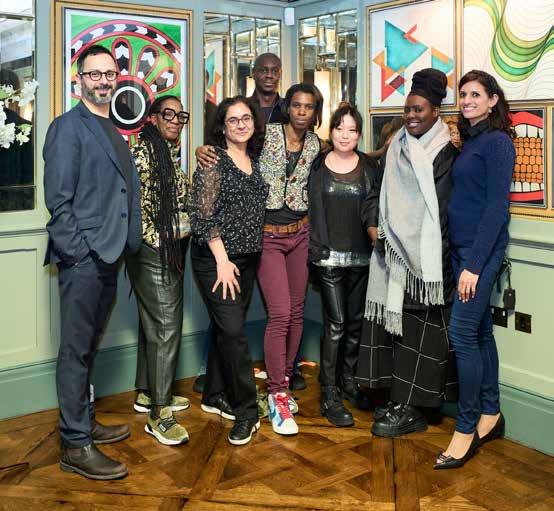
ScreenSkills train and support the people who make the shows the whole world loves. Our programmes are tailored to meet the needs of those at each stage in their screen career journey.
Programmes like Film Forward are designed to create change in the UK film industry by supporting experienced Black and Asian professionals to advance to more senior roles. Trainee Finder, ScreenSkills’ flagship new entrant programme, pairs trainees with film and TV productions, providing them with invaluable – and paid –working experience.
You don’t have to take part in a training programme to benefit from ScreenSkills support. We offer resources, access to bursaries and free online learning modules dedicated to helping people get into the industry and progress within it.
How can we help you? Visit ScreenSkills.com for more info.
Image - Film Forward cohort #2. Screenskills / Erroll Jones, WeShootLondon
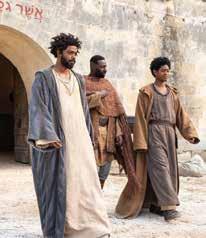

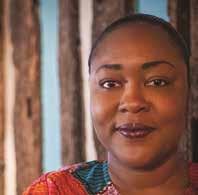

CONTENTS 5 Mission: Shots Fired 7 Decode: Drift 11 Allied Attack: Black Britain Unspoken Returns For A Third Series 15 Probe: Critically Thinking 18 Decode: Io Capitano 23 Allied Attack: Undocumented 26 Intel: Say Yes To The Dress 31 Probe: Kalista Sy 34 Learn To Adapt: The Book Of Clarence 38 Decode: Omen 42 Logistics 45 Base 46 Squad 34 18 31 Contact us www.tnbfc.co.uk / info@tnbfc.co.uk Follow us @tnbfc @TheNewBlackFilmCollective 11
Reel Impact, the Film and TV Charity’s new programme to support Black and Global Majority individuals and organisations launches in May!

Reel Impact, a brand-new programme to ignite change and create equity for Black and Global Majority individuals and organisations, arrives this spring! Created by a diverse panel of experts and industry leaders, the programme will provide support, resources, grants, and opportunities to help eligible applicants rise, thrive, and achieve their goals.
Reel Impact has grown from the Charity’s ‘Impact Partnership Programme’, announced to help address the deep-rooted and systemic nature of racism in the film and TV industry. It seeks to support the creation of a more inclusive, equitable, and anti-racist industry that properly recognises and values the talents of its Black and Global Majority members.
The programme will have three strands:
A Grants Programme: Grants of up to £10k for individuals, and up to £25k for organisations.
Career and Leadership Development: To help build on existing and leverage new partnerships between talent and organisations, with bursaries to support.
Long-Term Vision: Scaling Reel Impact for sustainability.
With the Grants Programme launching in May, Reel Impact Programme Manager, Anita Herbert, will be hosting a series of webinars from 10th April, to provide more detail, outline eligibility criteria and answer questions. Ahead of that, you can find Anita and other members of the Film and TV Charity team at TNB XPO on March 28th. There, Anita and CEO Marcus Ryder will be participating in one of the session keynotes and roundtable sessions. They’ll also be calling on Black and Global Majority community groups, individuals, and organisations to help them spread the word.
For more info on Reel Impact, please email reelimpact@filmtvcharity.org.uk and visit www.filmtvcharity.org.uk for details on how the Charity can support you.

Shots fired
*Kedu (Hi),
In 1962, Malcolm X stood up and said that “The most disrespected person in America is the Black woman. The most unprotected person in America is the Black woman. The most neglected person in America is the Black woman.” Well, it certainly seems that in the case of Diane Abbott MP or Meghan Markle, it isn’t safe in the UK either, over 60 years later. I bring this up as I welcome you, for the third year in a row to TNB XPO, because this affects all Black women. We cannot escape politics in the workplace. We must not be gaslit into thinking that we are in a post-racial era and that we are being oversensitive.

This is fresh trauma that we have to bear and it will seep into the fabric of our creativity. However, as you come through the doors of Rich Mix or digitally drop in, we shall have each other to talk to and light relief from the danger and disrespect for simply being ourselves. So pull up a chair and engage in our keynote speeches from industry leaders including returning Principal Partner – Film London, Warner Bros. Discovery, BFI, Bectu, Film Distributors’ Association and many more. You will be presented with opportunities to access the UK industries but also question if you are being truly included.
For the first time we are doing a complete building takeover – opening up to other sectors of the screen industries including gaming alongside intimate sessions on the top floor with workshops, 1-2-1s, Recruitment Fair and Black Market. Investment opportunities are back through Pitch‘n’Mix and Lion’s Den plus we shall once again invite the rest of the world to join us virtually as we jump from continent to continent online. A new element to our programming this year is our Lecture format but you will need to find out for yourselves the ‘provocations’ that we have lined up as we expose the issues that mean the most to our community.
As we push back against ‘divide and conquer’ so we can ‘provide and prosper’ we look forward to seeing you in whichever way you are able to show up and do some show business with us.
Together We Rise!
Priscilla Ikonnaya Igwe Founder + CEO
The
New Black Film Collective
*Igbo (Nigerian) language
5 MISSION
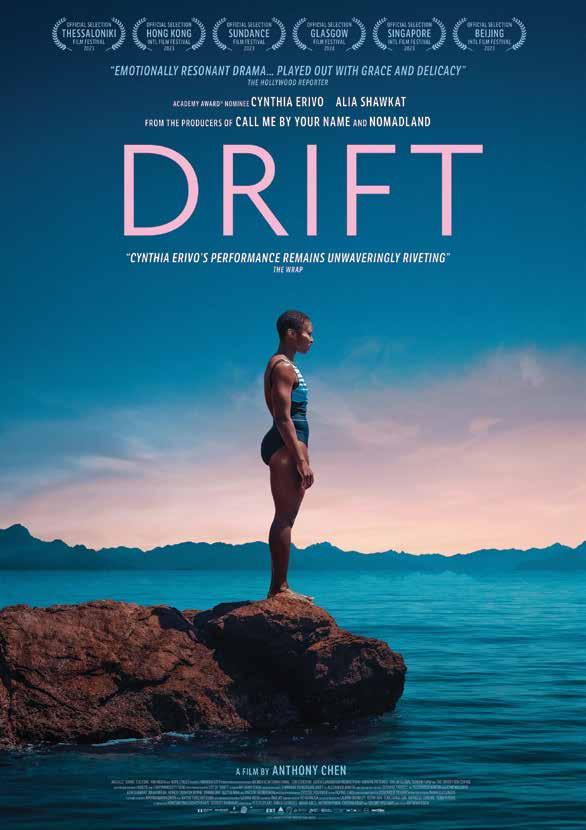

Drift
Drift stuns its viewers with calming, delightful scenes of an idyllic Greek island, juxtaposed delicately with the main character Jacqueline’s (Cynthia Erivo) destitute living circumstances. The introduction of the spontaneous bond Jacqueline forms with benevolent American tour guide Callie (Alia
Shawkat), leads to the reveal of Jacqueline’s unspeakable pain, and Callie’s past struggles that have led to both avoiding their original countries. Despite the gorgeous intrigue created by each protagonist’s story, portrayal and the joint on-screen chemistry, Anthony Chen’s (2023) drama leaves too much unsaid, attempting to rest the heavy burden of storytelling in the hands of Jacqueline’s trauma. At the end, one feels the weight of the neglected storylines, which steal the story’s momentum and lay the audience adrift in the vast ocean of potential.
7
DECODE
(l-r) Alia Martine Shawkat, Cynthia Erivo
The screenplay, co-written by Alexander Maksik and Susanne Farrell, is an adaptation from Maksik’s (2013) book, A Marker to Measure Drift. The 93-minute drama mostly silently watches Jacqueline, a Brit seemingly stranded on a Greek island, penniless and alone. Each scene relies on the unsaid emotion portrayed by Erivo for context clues, and tooshort flashbacks into her previous life. Comfortable London days with her middle-class white girlfriend (Honor Swinton Byrne), and days spent in her ministerial family home in Liberia amidst a civil war, are a far cry from her current reality. Now, Jacqueline spends her days avoiding power-hungry police
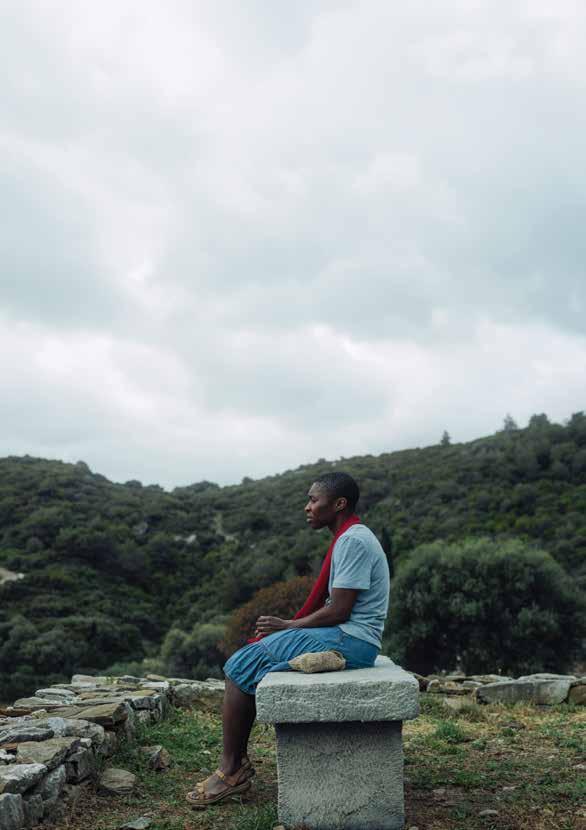
officers and almost pleading to offer foot massages to strangers so she can eat. We assume something has drawn her away from her family and friends to explain why none of these characters have resurfaced, and whilst the questions raise intrigue and mystique, they leave us frustrated when they are not answered at the film’s climax.
This is a constant throughout Drift’s many scenes with world-building and plot-thickening potential are abandoned in favour of a build-up to Jacqueline’s trauma, after which the film sags. Rather than exploring how exactly Jacqueline arrived wherever she is, what year it is, who the man is (Ibrahima Ba) that
DECODE
Jacqueline keeps encountering, what the aftermath of his run-in with the police, and why is there such disdain toward Jacqueline? It leaves a few questions: is it just anti-immigrant sentiment or anti-blackness, and why is Callie so drawn to her? Eventually we learn, Jacqueline’s white knickers employed as a slightly unconvincing MacGuffin, why she is so standoffish and disjointed from society – but this is at the expense of further expansion in any other area.
Without a doubt, Erivo is fantastic, and she must be. Chan’s vision rests on the power she evokes, bringing Jacqueline’s trauma to light as she stutters through raw emotion, retelling the unimaginable. Skawkat brings a natural confidence that breathes life into Callie, and their chemistry feels natural, which aggrandises the disappointment that the onscreen relationship was snipped before it could truly bud.
Given the multiple options for story development, one wonders what lay behind Chen and Maksik’s decision to allow Jacqueline’s horrific trauma to monopolise the plot. Drift, whilst it could have been identified as a more devastating Call Me By Your Name, especially as the film shares the same producers, it aligns more with a colourful Malcolm & Marie. It attempts to draw the audience’s attention through a selfserving lust for Black trauma, reminiscent of the shallow fixation on aspects of Black culture and pain that de-centres Black autonomy and recognition.
When coupled with the stripping of both women’s voices – literally and figuratively – Drift suggests that Black and female pain is the only thing worth listening to. Ironically, a film led by two women neglects their dialogue, backstory and even personality, instead snipping in b-roll of them often laughing at a joke unknown to the viewer. Drift wanted to achieve an atmospheric feel that is best achieved through the script. We watch a caricature of women in pain, with their smiles and laughter hiding their semicooked friendship.
It is disappointing that there were many great themes teased throughout the film. Chen, Erivo and Shawkat are highly qualified to explore the proximity of white people to Black trauma, which is ultimately overshadowed by their inaction. Or how the universal Black experience manifests as solidarity against police megalomania, though self-preservation prevails. Rather than a writing failure or oversight, perhaps the script is a cautionary tale against Black and female stories being used as tools for storytelling, and not engaged as the authors of their own story.
This calming drama highlights the lingering effects of unspeakable trauma, but also the ramifications of muting the subjects of that very tale. Drift is a casualty of Black trauma, which we are quite frankly, tired of seeing. Black trauma is not in itself an interesting plot point anymore. Drew Chateau l
9 DECODE
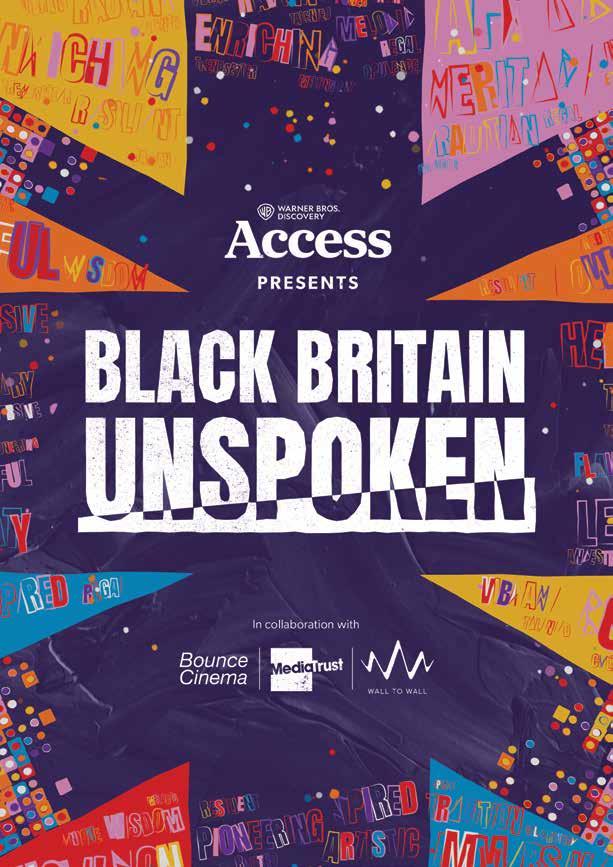
Black Britain Unspoken returns for a third series
Black Britain Unspoken, part of Warner Bros. Discovery (WBD) Access, the talent development division for underrepresented creatives, is returning for a third series in 2024. Black Britain Unspoken aims to give opportunity and voice to Black British filmmakers who are breaking into the industry, as data shows Black people continue to be underrepresented across director, writer and producer roles in the UK.1
During WBD’s fireside chat on Wednesday, 27 March 11:30 – 12:15 at TNB XPO, Black Britain Unspoken alumni will join Rico Johnson-Sinclair, Training & Skills Director CrewHQ, to discuss the programme and the impact it has had on their career to date.
Launched in 2022, Black Britain Unspoken gives filmmakers a pitch-to-production experience. Delivered in collaboration with Media Trust, three aspiring filmmakers will also be offered professional development sessions
focused on media training and career progression. This year, award-winning UK production company Wall to Wall, part of Warner Bros. International Television Production, is joining the programme as production partner. Bounce Cinema, who partnered with Black Britain Unspoken in 2023, will continue its support through the judging stages, training, and as premiere event partner.
To date, Black Britain Unspoken has identified and supported six incredible filmmakers. The 2023 cohort included Alterior by Terrie Aghaizu, Beats From Heaven by Eden Igwe and Food, Music & Vibes by Monique Needham, each providing authentic, original perspectives of what it means to be Black and British.
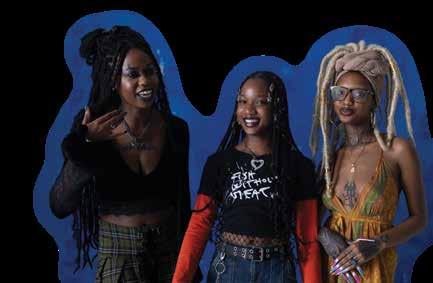
11
ALLIED ATTACK
Alterior, Terrie Aghaizu
Since taking part in Black Britain Unspoken, Eden has been awarded an Honourable Mention for her film at the UK Seasonal Short Film Festival, Monique has been nominated for The Victor Adebodun Award for Debut Director (Unscripted) at the Edinburgh TV Foundation New Voice Awards and Terrie has been selected for the National Film Festival for Talented Youth 2024, whilst 2022 filmmakers have had their films recognised at industry leading festivals such as Unscripted at the Edinburgh TV Festival and the International Shorts Film Festival. The 2024 selected films will launch on discovery+ in October as part of WBD’s Black History Month celebrations in the UK. Applications are open until Monday 08 April.
Asif Sadiq MBE, Chief Diversity, Equity and Inclusion Officer Warner Bros. Discovery said, “We’re delighted to launch series three of Black Britain
Unspoken. We are so proud of the six fantastic directors we have been able to identify and support. Working with
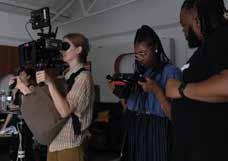
industry leading partners like Media Trust, Bounce Cinema and now Wall to Wall – we’re able to not only improve access and opportunity but deliver best-in-class training, mentoring and experiences.”
Reflecting on their favourite part of the process, the Black Britain Unspoken S2 filmmakers said:
Terrie Aghaizu “It’s hard to choose my favourite part! I think the process of talking to my contributors and engaging with them in such an intimate way to ensure I told their story correctly is definitely up there. I worked very closely with my editor throughout the postproduction process to piece my story together. This was very interesting as otherwise the structure of the film could have been very different.”
Eden Igwe “A huge highlight was the shoot day where we recorded the contributor interviews. Working with an experienced team in such a beautiful studio setting filled me with so much joy. Every time I looked at the monitor, I saw the magic of months of work coming together. It’s an awesome feeling that I don’t think I could compare to any other experience!”
Monique Needham “I was so nervous in the build-up to my pitch, but it felt so freeing to sell my idea on my own terms and style. Before the shoot I was super nervous, but the day itself was so much fun. The team we had was great and I had actually worked with some of them before, so it definitely made me feel more relaxed.”
12
ALLIED ATTACK
Alterior, Terrie Aghaizu
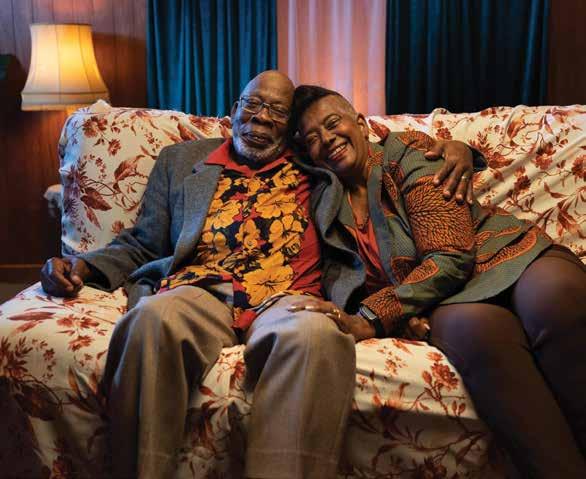
WBD Access is also bringing its Northern Writers’ Programme, in partnership with Wall to Wall North and the Royal Exchange Theatre, back in 2024 for a third series. The programme offers theatre writers from the North of England an opportunity to branch into television, empowering them to carve out successful careers across both stage and screen. Applications are open until Thursday 28 March.
In addition to the commitment to increase access to the industry for underrepresented creatives, WBD has
also broadened its skills offering with the launch of CrewHQ in November 2023. The new on-site training centre based at Warner Bros. Studios Leavesden is designed to support existing crew, create career routes for people of all backgrounds and foster the next generation of Film and TV production talent. l
1Creative Diversity Network: Diamond
The Sixth Cut 2021-22
Search ‘WBD Access X Black Britain Unspoken 2024’ to apply.
13
ALLIED ATTACK
Food, Music & Vibes, Monique Needham
Shaping the future of UK documentary together Join us: DocumentaryFilmCouncil.co.uk @docfilmcouncil Owned and run by and for its members, the Documentary Film Council (DFC) is a new democratic umbrella organisation for the UK’s independent documentary film industry. Join today and let’s shape the future of documentary together.
Critically thinking
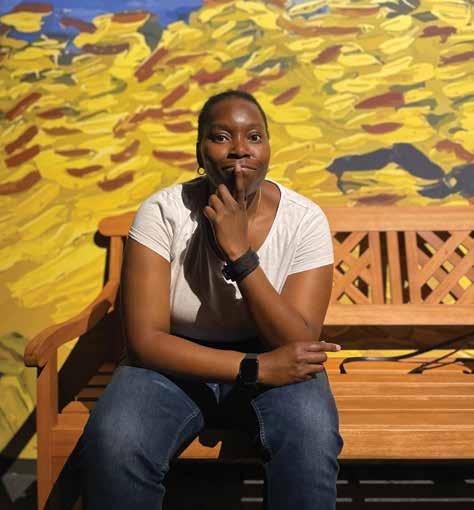
As Jefferson Davis once said in SpiderMan: Across the Spider-Verse, aka my favourite film from 2023, – “Look, life is a journey!” As comedic as that line delivery was (thanks to the artistic delivery by Brian Tyree Henry), the essence was certainly true when I became a Freelance Film Critic!
I’ve always been a film fan. I was a nerdy, sci-fi-loving kid who wanted to learn all about the force thanks to Star Wars (a love I still carry today). I would classify a cinema as my ‘second home’ thanks to Saturday trips to see the latest movies of the week. Watching directors such as Scorsese, Spielberg and
15 PROBE
Kelechi Ehenulo
Spike Lee captured my imagination on the possibilities of filmmaking and storytelling. And yes, Disney’s The Lion King was my most-watched animated film, introducing me to my first Hans Zimmer score. But little did I know, these treasured moments of my youth became the building blocks of my film journey. It started in 2013, but the idea of becoming a film critic didn’t materialise. I was working at my day job when my friend – who always enjoyed our film chats – suggested that I should start a film blog. My response was a simple chuckle with the now immortal words whenever I tell this story: “Who’s going to read that?” Well, he had the last laugh! Months later, after catching a horrible flu and needing something to do while I recovered, I created a blog – Confessions From A Geek Mind.
My blog became my entry point into the film journalism industry. I may not have gone down the traditional paths such as a university course, but I was willing to learn the etiquette and practices and experiment with my writing. The more I wrote (whilst expressing my love of film), the better I became – and that opened doors to other opportunities. I started writing for other sites such as Set the Tape, got my first paid commissions through Film Stories, JumpCut Online and Movie Marker, wrote features for Digital Spy and The Daily Mirror, and reached a writing (and podcasting) pinnacle with Empire Magazine. In 2023,
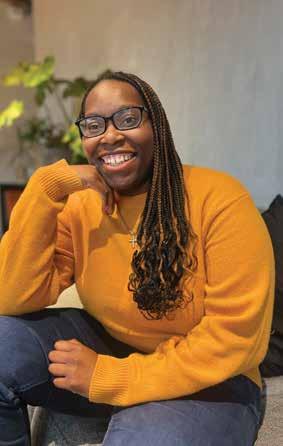
I was inducted into the Critics Circle marking me as one of the top establishing critics in the country.
A big part of my goal is to inspire the next generation of film critics. The lack of inclusion is evident, especially when our life experiences have a unique insight into how we view cinema – and it’s important to acknowledge that. So, if you want to learn more about the journey and how you can be a shining light in the film journalism world, come and check out my class on Thursday 28th March, and let’s make a change together.
Kelechi Ehenulo l
16
PROBE
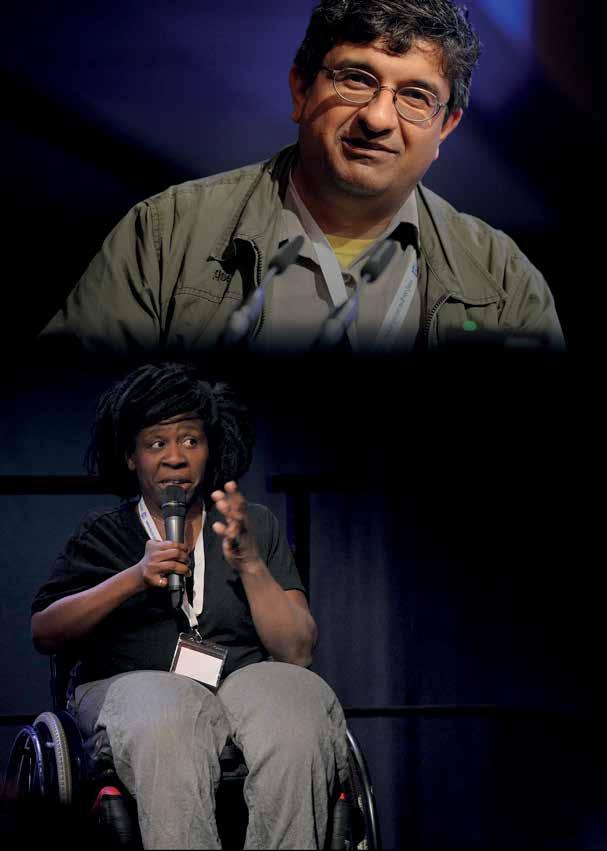

18
DECODE
Io
Sarr Capitano
Seydou
Capitano
A pursuit of happiness occurring across two continents, the audience is treated to this heart wrenching, familial triumph against adversity. Seydou (Seydou Sarr) and Moussa (Moustapha Fall), 16-yearold cousins and best friends, dream of leaving Senegal and becoming stars in Italy. They are not yet alive to all that entails, but soon grow beyond their years during their labyrinthine journey across the Sahara Desert, the corrupt underbelly of Libya and the Mediterranean Sea. At a time where anti-immigration sentiment is rife across Europe, Io Capitano is a punchy call to humanise those brave enough to risk it all in aid of a promised oasis.
Directed by Matteo Garrone, this 121-minute dramatic adventure follows Seydou and Moussa, who are working hard to leave for Europe – a place, in their mind, full of hope, wealth and untapped potential. Quickly, we become cognisant of Seydou’s tender
and supporting countenance, and the rambunctious rugged confidence of Moussa. Together, they are a joint voice that dreams of becoming so famous that the whites will be asking for their autographs.
Whilst we understand that their families do not have a lot, Seydou sleeping on a mattress in a shared room with his four sisters, their poverty is not the chosen lens through which the audience are invited to view Senegal. The focus however is the playful joie-de-vie and serious dedication to love and culture present throughout, a foundation which allows Seydou such conviction when he decides not to leave Libya alone. Indeed, a thread integral to the makeup of the screenplay is community. Even in the bleakest situation, amongst those who have the least, one finds the most shared hope and care, without which, neither lead would have made it.
19
Io DECODE

Absent these moments of civil duty, Io Capitano would have been a sobering tale of corruption and greed, and how western propaganda of the great Europe is actively killing people of colour.
In light of the UK Government announcing harsher rules for immigration and gaining citizenship, anti-immigration rhetoric is strong, and manifests as a fierce need to segregate based on borders and origin. This film provides the missing context behind the statistics and aerial shots to refund people their humanity. Much of the film is hard to watch, and it should be. Though Io Capitano is fictional, it very well could be a biography, a message hinted by the dual protagonists sharing the name of
the actors portraying them. When shown headlines attacking lazy immigrants who steal jobs, Io Capitano rebuts with images of Seydou tied like meat at a butchers, forced to work to reclaim his natural freedom. Seydou, Moussa and every real African risk becoming victims of modernday slavery, clandestinely operated by the Liberian mafia with impunity, in the hope of a better life.
Paolo Carnera’s cinematography is beautiful and tragic as it needs to be, weaving a visual narrative that complements and elevates the plot. The sweeping shots of the Sahara’s desolate landscape, contrasted with the cold, bleak crowded holding room show the separation from the hopeful commence
20 DECODE
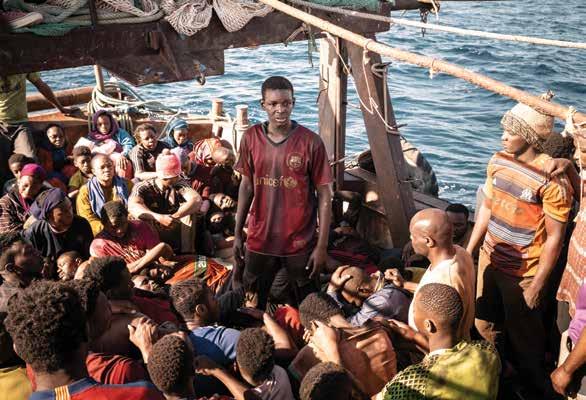
to the lowest junction ever experienced for Seydou. Io Capitano portrays a production quality rivalling Lion (2016) or Slumdog Millionaire (2008), the cinematography being integral to the experience of the film.
This is all supported by the cast’s excellent command of acting. Whether we are watching Seydou carefully wash the dirt off Moussa when he isn’t capable, or Martin (Issaka Sawadogo) cradling a broken Seydou, they allow the audience to live through it with them. Hailing directly from Dakar himself, non-professional actor Sarr captains the film expertly, with a worthy win of the Marcello Mastroianni Award for Best Newcomer. Sarr displayed
such command with a full range of all emotions, that you feel his hope, fear, exhaustion, and pure tenacity to survive in every scene.
Told in three different languages, shot across the African continent, and inclusive of the boys’ song in the credits, Garrone managed to centre the voice of the voiceless. An eye-opening foray that inverts the camera lens towards its subjects, and breathes air into the story, that we have no choice but to feel and live it. Io Captiano explores the often tragic journey many make, and seeks to remind us that behind the numbers, are people who deserve our attention and our respect.
Drew Chateau
l
21 DECODE
The best place to tell a story. The end.
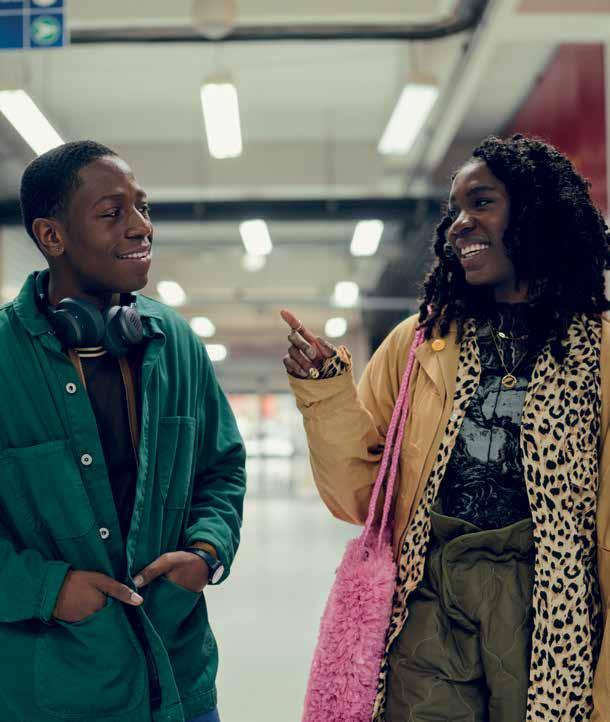
If you’re working in film, TV, animation or games, Film London can offer you expert advice on training and development, logistics and the UK’s tax reliefs.
From binge-worthy box sets to fresh indie drama, we can help bring your ideas to the screen.
@Film_London
filmlondon.org.uk
London.
David Jonsson and Vivian Oparah in RYE LANE.
Photo by Chris Harris. Courtesy of Searchlight Pictures. © 2023
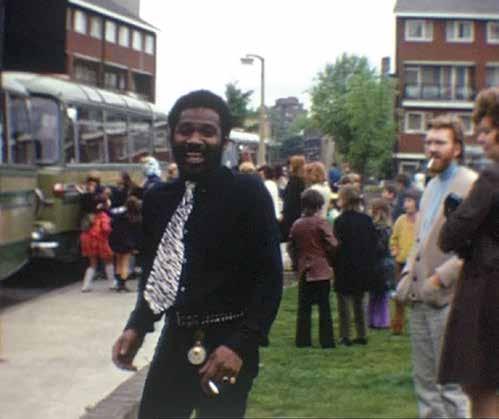
Undocumented
Get involved with The New Black Film Collective (TNBFC) and London’s Screen Archives exciting new project, Undocumented. Undocumented seeks to address the lack of Black stories in screen archives through a public programme that deepens community engagement through practical, discursive and intergenerational activities and sessions. London’s Screen Archives (LSA) is a unique network of over 70 organisations
across London with a collective vision –to preserve and share London’s history on film over the last 100 years through their collections. Archives play a pivotal role in telling the stories of London and Londoners, and it is integral that Black communities have a place amongst these. LSA is managed by Film London, the capital’s screen industries agency, who alongside their pledge to sustain, promote and develop London as a global content production hub, also support
23 ALLIED ATTACK
Still courtesy of Brandon Estate Cine Club film Canvey 1972, Southwark Archives, copyright Brian Waterman and the estate of Richard Morgan
the development of the city’s new and emerging filmmaking talent and invest in a diverse and rich film culture.
In collaboration with TNBFC and thanks to support from the BFI awarding National Lottery funding, over the next year, we will be running free screenings, coffee mornings, panel discussions and oral history projects. We will show treasures from the archive, and encourage people to document and share their own stories. For this first phase of Undocumented project we will be based in Southwark, Lambeth, Newham and Hackney, all of which have rich public archives that are also members of the LSA network.
As part of the LSA network we work with all our members to digitise their films and ensure the long-term sustainability of their moving image collections, as well as offering opportunities for public engagement through screenings and events, volunteering programmes, training and education. Based across these four boroughs, we will connect with local community groups to host and cocurate activities revolving around screen archives, building dialogue and interest in local histories, legacies and celebrations including Windrush Day in June.
As another strand of the Undocumented project that shares the same ambition to make archives more accessible, the LSA collections will be featured across TNBFC’s and Reclaim The Frame’s
programmed screenings, through complementary and curated archive content that introduces their films. TNBFC has a range of programmed screenings across the year which foreground Black led film, and Reclaim The Frame works to also showcase film from minoritised identities with a focus on filmmakers of marginalised genders. Through integrating moving image from public archive collections with contemporary cinema, we hope to provide yet another entry point to the wealth of material held by the LSA network and change the context in which archive film is seen and engaged with.
We are excited to bring together speakers from across the sector for a panel discussion at TNB XPO to discuss the importance of representation in the archive and delve further into what the Undocumented project entails and its long term goals. If Undocumented sounds like a project you are interested in, keep an eye on our websites for more events and activity, and get in touch if you have any home movies or other films that you think should be preserved for generations to come. Lauren Gee l
Email: screenheritage@filmlondon.org.uk
Phone: +44 (0)20 7613 7674

24 ALLIED ATTACK
‘‘ ‘‘


Sara Putt Associates nurturing today’s talent for tomorrow. www.saraputt.co.uk
‘Say yes to the dress’:
Emasculation
of Black men in Hollywood or homophobia?
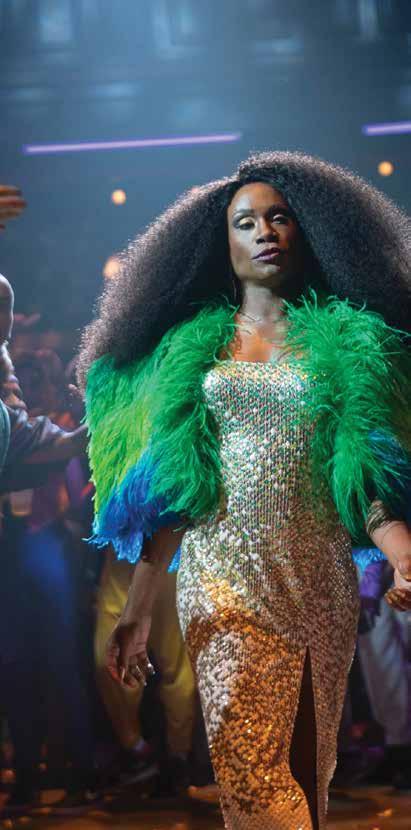 Billy Porter, Pose
Billy Porter, Pose
26 INTEL
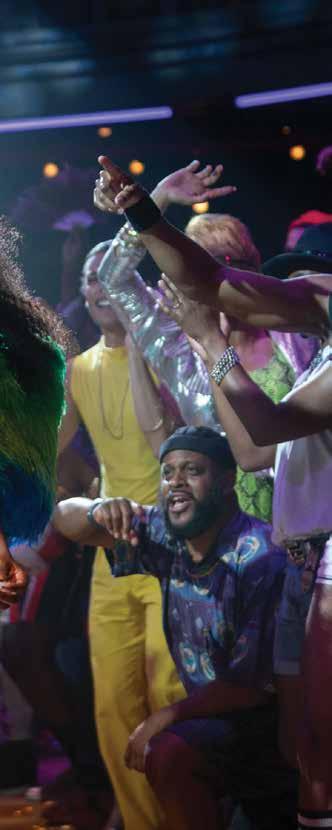
Hollywood’s portrayal of Black men has ignited intense debate, particularly concerning representations that challenge hetero-normative gender ideas. From Tyler Perry’s Madea to Billy Porter’s iconic red carpet appearances, the visibility of Black men in dresses has sparked conversations about masculinity, gender identity, and representation in the media. Through the limited binary concept that Black men are either dangerous and thuggish, or effeminate and wimpy – a liminal space was created through which Black men can be accessed palatably by society (which has its roots of subjugation in slavery), through drag.
There is a notion that there is a right of passage for a Black man in Hollywood to achieve success, and that is through saying yes, to wearing a dress. Tyler Perry did this with the Madea franchise in the ‘00s, Eddie Murphy with Norbit (2007) and Martin Lawrence in the Big Momma’s House series (2000 –2011). All of these men have gone on to achieve wealth, success and status in their respective careers in acting, producing and comedy. These portrayals, often featuring Black men in dresses, have sparked conversations about perceived masculinity, gender identity, and the broader implications for heteronormative societal perceptions. Is this a progressive move towards gender inclusivity, or does it perpetuate harmful stereotypes of emasculation and homophobia?
Katt Williams is one comedian who did not do it. In Katt Wiliams’ recent explosive interview with Shannon Sharpe on Club Shay Shay, which racked up 3M views in 3 days, he exposed a conspiracy that Hollywood has an agenda to put Black men in dresses. He mentioned that due to his personal boundaries, he has been able to evade this inevitability that other comedians have had to accept in order to further their careers, sometimes against their will. He speaks about the effort to emasculate Black men in film and TV, and those who go along with it will get success, and those who don’t, like Williams and Dave Chappelle, have had to progress with their careers without support from the industry.
Dave Chapelle talks openly about being a conspiracy theorist in an interview with Oprah in 2006, and mentioned a pattern of seeing Black men in a dress at some point in their career. In his own anecdote, he refused to wear a dress when he was pressured by fellow actor, Lawrence, and other crew members on set. His resistance to this was based mainly on the fact he wanted to focus on the comedy writing and delivery, as opposed to the appearance of what he would have to wear, and how that would make him feel on a personal level.
Kevin Hart’s Quvenzhane Wallis SNL skit in 2013, where he impersonated the then 9-year old, dressed as a pope, elicited many laughs and a raised profile for Hart. Following on from this, Hart’s
27 INTEL
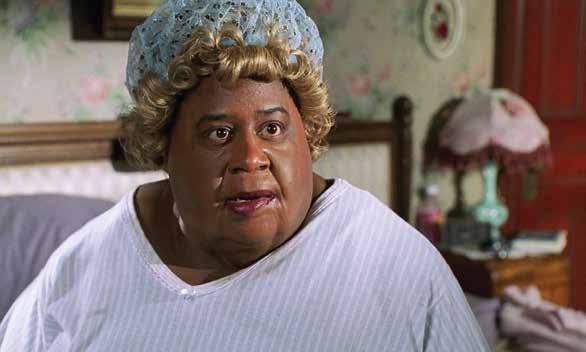
career skyrocketed with an incredible five comedy sketch release the year after in 2014. Prior to this, Hart released one sketch a year from 2009 – 2013. Now in 2024, Hart has a prolific career in producing, acting and comedy, selling out shows across the world. Similar individuals who have worn dresses include the Wayans brothers, Marlon and Shawn, in White Chicks (2004), Perry, Murphy and Lawrence, and many more.
Historically, cross dressing or drag, has been closely associated with theatre, drama and an ancestor of this is the pantomime dame. The pantomime dame embodies a female character, usually played by an older male actor. With a grandiose and hyperbolised feminine quality, the pantomime dame is a conduit for lewdness and cheap laughs during production.
However, the concept of men wearing dresses or skirts is not new, illustrating the fluidity of cultural expression across human civilisations across history. In many African cultures, dress-like garments have been worn by men for centuries, often as part of traditional attire that reflects cultural heritage and identity. For example, in various regions of West Africa, men wear garments such as the agbada, a flowing robe-like garment with wide sleeves, or the boubou, a long robe that is often elaborately embroidered. These garments are not only functional but also serve as symbols of status, lineage, and cultural pride. Similarly, in parts of East Africa, men wear garments such as the kanzu, or in Scotland, where the kilt, a pleated, knee-length wrap-around skirt has been worn traditionally since the 18th century.
28 INTEL
Martin Lawrence, Big Momma’s House
In 2019, the entertainment landscape witnessed a groundbreaking moment with Billy Porter’s historic win at the Primetime Emmy Awards for his role in Pose (2018-2021). Porter’s portrayal of ‘Pray Tell’ marked a significant milestone, not only as the first openly gay Black man to win in the Outstanding Lead Actor in a Drama Series category but also for challenging stereotypes and expanding the representation of Black masculinity on screen. His unapologetic embrace of gender fluidity resonated deeply, sparking conversations about the intersectionality of race, sexuality and gender identity. RuPaul’s Drag Race (2009) is an American reality competition series where contestants battle to win a large cash prize, with the largest being $200,000 – a life-changing amount of money for many worldwide. Now that
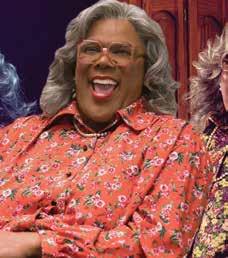
the Drag Race franchise has gone global, this show has been successful in bridging the gap between hetero-normative and LGBTQ+ communities, showing the common threads of humanity, which we all share.
Balance is necessary as the inclusion of Black men in dresses is a form of resistance against homophobia and transphobia. By showcasing diverse expressions of gender identity, filmmakers and actors are advocating for acceptance and equality, fostering a more inclusive society where individuals are free to express themselves authentically without fear of judgement or discrimination.
However, the angle within how this comes about is equally as important. It’s crucial to consider the intentions behind these portrayals and the impact they have on both individuals and communities, as it brings the question whether this is a tool used to reinforce harmful stereotypes or contribute to the marginalisation of already vulnerable groups? Also, do these men wear dresses out of their own choice and free will, or are they cajoled through the expectation of a successful career?
As we continue to push for greater diversity and inclusion in film and television, it’s essential to critically examine the ways in which different identities are represented and ensure that all individuals are portrayed with dignity, respect and authenticity. Nikki Iyayi l
29 INTEL
Tyler Perry as Madea
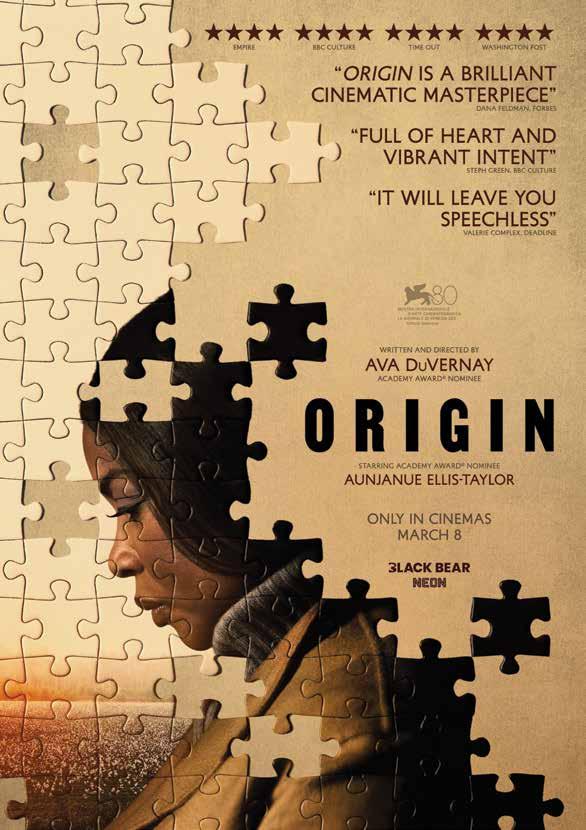
Kalista Sy
Kalista Sy’s pioneering series Maitresse d’Un Homme Marié (Mistress of a Married Man) (2019) shattered the mould of Senegalese media, striking at the intersection of tradition, feminism and modernity. As the director and visionary behind the series, Sy not only carved out a space for Senegalese women to shine on screen but also challenged societal norms and sparked crucial conversations about female identity and sexuality.
Sy’s remarkable journey began as a selftaught writer, crafting an adaptation of MDHM into a television screenplay in 2016. Her vision resonated with Serigne Massamba Ndour, a prominent Senegalese producer, who brought the series to life in 2019. Launched on Marodi TV, Africa’s first online platform with replay functionality, MDHM quickly amassed a staggering 6.3 million views on the pilot episode alone, a testament to the show’s profound impact. This success story shows that Africans enthusiastically embrace content created by their own, as evidenced by Marodi TV’s 2.7 billion video views – a clear challenge to the long-standing dominance of Western narratives and a powerful force instilling cultural pride.
MDHM’s groundbreaking portrayal of female agency and exploration of themes like polygamy and sexual liberation did not

go unnoticed by conservative segments of society. Just a week after its launch, the series faced fierce backlash from the Comité de Défense des Valeurs Morales au Sénégal (Committee of Defence of Moral Values in Senegal), who deemed it “shocking, indecent, and obscene.” This unprecedented controversy revealed the significance of MDHM as a trailblazer – a show crafted by women, for women, with a narrative centred around their experiences. It delved into the complexities of womanhood, love, resilience, and the everyday struggles faced by women not only in Senegal but across Africa and beyond.
Sy’s unwavering dedication to pushing boundaries and defying convention has earned her international recognition. In 2019, she was rightfully included in BBC’s prestigious list of 100 inspiring and influential women worldwide. This accolade solidified her position as a leading voice for change, not just in Senegal but across continents.
31 PROBE

In 2021, she launched Kalista TV, introducing her second online series to audiences yearning for raw and authentic storytelling. Through her work, Sy directly confronts deeply entrenched societal norms in Senegal. One such example is her deliberate exclusion of her characters seeking traditional means of spiritual guidance for psychological issues. Instead, she boldly portrays characters seeking professional mental health support, sparking crucial conversations about wellbeing in a culture where such discussions are often shrouded in silence and stigma.
Beyond these specific examples, Sy’s influence extends far beyond the screen. She has become a role model for aspiring female filmmakers across Africa, inspiring them to pursue their creative visions and challenge the status quo. Sy’s impact transcends national borders, resonating with audiences worldwide. MDHM has been dubbed in multiple languages and obtained international acclaim, cultivating cross-cultural understanding and sparking conversations about universal themes
that transcend geographical and cultural boundaries. The series has been praised for its nuanced portrayal of women’s experiences, its exploration of complex societal issues, and its ability to entertain and provoke thought in equal measure.
Sy’s unwavering vision and exceptional storytelling powers have not only redefined Senegalese media but also ignited a powerful movement for social change. By amplifying female voices and challenging the status quo, Sy has paved the way for a future where diverse narratives and authentic experiences take centre stage, not just in Senegal but throughout the world. Her journey, and with every captivating story she tells, she continues to inspire and empower a generation of storytellers and viewers alike. As Sy herself has stated, “We need more stories told by Africans, for Africans, and for the world.” Through her unwavering dedication and groundbreaking work, Kalista Sy is ensuring that these narratives are not only told but also heard and celebrated on an international level. Nikki Iyayi l
32 PROBE
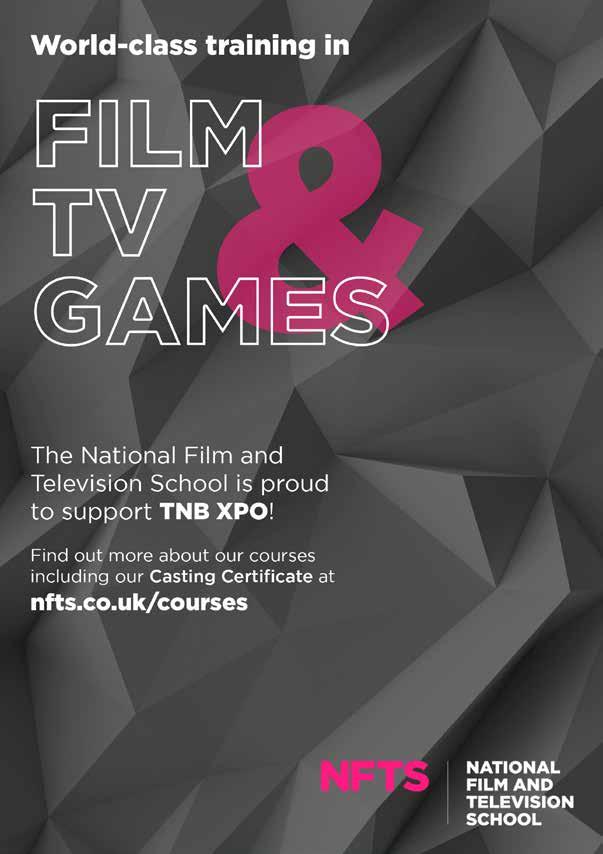
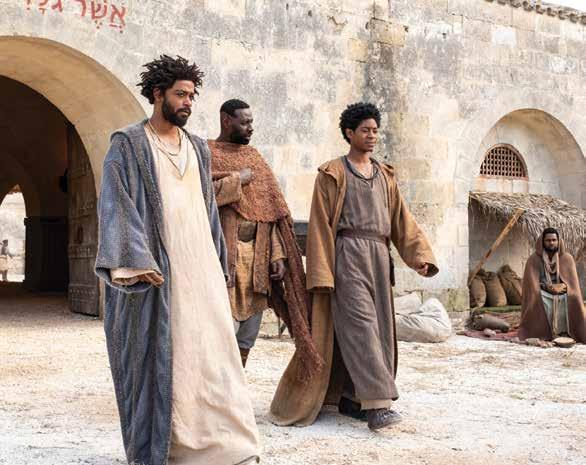
Jesus walks with me
After exploding onto the scene with his 2021 directorial debut The Harder They Fall, filmmaker Jeymes Samuel pans his lens from the Old West to the New Testament with his sprawling new epic The Book of Clarence. Inspired by the biblical dramas Samuel grew up admiring and the scale with which they conveyed art and entertainment in equal measure, the film is an attempt to revive, with swagger, a hibernating genre for contemporary audiences who have seen it all. But they’ve never seen this.
The Book of Clarence tells the story of Clarence (LaKeith Stanfield), a downon-his-luck denizen of Jerusalem in the year 33 A.D., who embarks on a misguided quest to capitalize on the rise, celebrity and influence of a messiah named Jesus. For Clarence, God doesn’t exist, but Jesus and, most notably, his
12 apostles do. They may follow a flawed magician, in Clarence’s eyes, but they are beloved stars all the same. They are also protected and revered. For a neighbourhood philanderer and peddler who suddenly finds himself owing local gangster Jedediah the Terrible a sizable amount of coin, that part is key. Jeymes describes in his own words, his motivation in making this film –
“The Book of Clarence is my way of giving people a full meal of how I see cinema, as an all-inclusive environment. While I am not part of a religious sect, I count myself as a believer in God and something greater than myself. But this film is not meant to be a ‘religious’ film or a retelling of biblical scripture. It really is for everyone, no matter what your belief system may be.”
34 LEARN TO ADAPT
“As a storyteller, I want to give audiences something they’ve never seen before. As a person of faith, I want to deepen our understanding of the historical context that has shaped our beliefs. And as an entertainer, I want to show you a wicked good time. Where those three points intersect is The Book of Clarence, a cinematic extravaganza 2,000 years in the making.”
“The film arose out of my desire to tell a story about the environment in which I was raised, but situated in a biblical setting. I am a huge fan of cinema and I’ve always loved westerns and biblical epics, which is why those are the first two genres I explored straight out of the gate as a filmmaker. I grew up on their
larger-than-life depictions and sturdy craftsmanship. But in today’s landscape, these genres are rarely explored. I feel like that is such a mistake because these stories, rooted in the historical, hold the potential to illuminate our presentday lives.”
“Back in the day, there was The Greatest Story Ever Told (1965), Jesus Of Nazareth (1977), Quo Vadis (1951), Samson And Delilah (1949), The Robe (1953), The Ten Commandments (1956) – all of these wonderful, vibrant movies of scale and substance. Going to see a biblical epic was as common as going to see the latest superhero saga today. But for me, Jesus was the best, dopest superhero of all time. Perhaps the first one ever.”

35
LEARN TO ADAPT
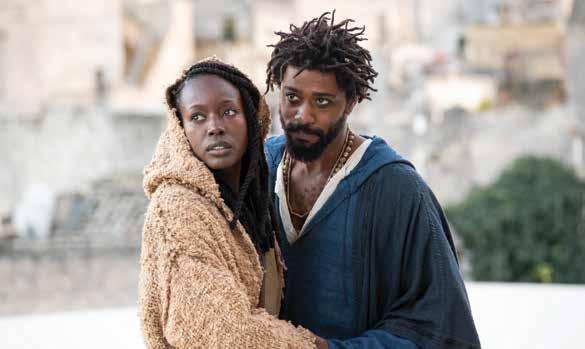
“The idea for The Book of Clarence came out of my admiration for this breed of cinema, and truly, I love them all. But I always found something particularly compelling about those movies that didn’t necessarily tell the story of Jesus or adhere to the very pointed and purposeful parables laid out in the Bible, stories that instead ran parallel to those proceedings. Movies like Ben-Hur (1959), for instance. I loved others like Spartacus (1960), as well, that really unearthed something of daily life in that era, that were groundlevel and all the richer for it.”
“After all, the Bible gives you broad strokes. Those are the bricks. The mortar that holds it all together is our faith. But what of the stories that exist within the cracks of that mortar? What of the everyday nonfiction of lives that crisscrossed with biblical history as a
backdrop? What of the hairdressers and village cobblers and mundane charlatans that walked the very same earth as Jesus Christ?”
“The Book of Clarence is one of those stories. More to the point, it’s a story about a man’s journey of self-discovery. Clarence is a dreamer, but he isn’t an executor of those dreams. He can do anything, but he doesn’t see it within himself that he can. He doesn’t know his own power. He’s a man without faith who finds it along the way and who discovers that, with God at his back, he, too, can walk on water. My sincerest hope is that you’ll see this film and conclude that, while our dreams may seem out of reach, our ambitions are quite tangible and real.”
“And hopefully you’ll have a wicked good time as well. We certainly did while making it.” l
36
LEARN TO ADAPT
(l-r) Anna Diop, LaKeith Stanfield












Omen
38 DECODE
(l-r) Marc Zinga, Lucie Debay

Omen (2024) is the first feature film by Belgian-Congolese director, actor and musician Baloji. The film follows a young Congolese man who, after spending years in Belgium, returns to his birthplace of Kinshasa to confront the intricacies of his family and culture.
The film isn’t strictly linear in nature. It introduces the perspective of peripheral characters, including some related to Koffi – his mother Mujila and sister Tshala –and others outside of their family, as well as homeless teenager Paco. This change in perspective can be confusing to watch, especially in the case of Paco, as you’re left wondering how their stories fit with the protagonist’s. Looking at the film overall however, it’s understandable why Baloji decided on this structure; the film is an exploration of Congolese society and culture, so each character has their moment to showcase their experience of life in Congo.
One of the core themes explored within the film is that of western culture versus African culture which is executed in an impactful and lasting way from the outset. Our introduction to Koffi shows his partner shaving his afro ahead of their upcoming trip to his birthplace. In hindsight, we come to understand his actions were made solely to abide with his family’s beliefs, immediately highlighting the differences in culture. Throughout Koffi’s story, we witness the outlandish abuse and general
disregard he suffers at the hands of his family due to their belief that his birthmark means he’s marked by the devil. Even Tshala, who presents as more western in her beliefs compared to the rest of her sisters and parents, visits a spiritual doctor on the recommendation of her sisters, after revealing that she has a sexually-transmitted disease. Her succumbing to this, against her better judgement to see a medical doctor, does a great job of showing how deeply these beliefs are held and how difficult it can be to break free of them.
Baloji does an impressive job with this film in showcasing the lengths people will go to for their beliefs at the expense of the people they’re supposed to love. Love is another prominent theme throughout each character’s journey and we are able to see the different kinds of love that can be experienced in life – the love of a mother for their child, the love between siblings and the love between husband and wife.
Through the use of symbolism, particularly the frequent use of the colour pink, which connotes love, nurture, compassion and good health, we are able to visualise the different forms of love. The film’s opening scene features a woman lactating into a lake in the desert which turns a pinkish lilac colour; a representation of the love
39 DECODE
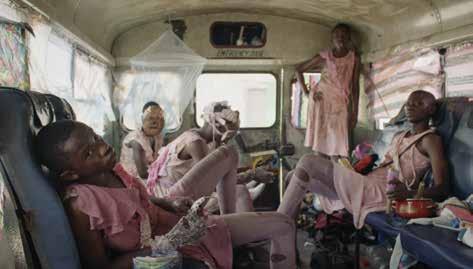
women give with their bodies. Paco, a homeless teenager in Congo lives with a group of boys who all wear pink dresses which we come to find out is in honour of his deceased sister; a showcase of the all-encompassing love between siblings. Mujila, after the passing of her husband, is left in an empty room with only a pink wreath hanging on the wall. She tells Tshala about the sacrifices she was forced to make in marrying her late husband and the love they found over time.
Overall, this is an impressive debut feature film and will likely leave a lasting impression because of its striking cinematography, use of symbolism and non-linear structure which ensures paying full attention to everything happening on screen. Though there isn’t a clear connected plot, it is still a thoroughly enjoyable watch.
The story is quite heartbreaking, particularly the treatment of Koffi, learning of Paco’s sister and the sacrifices Mujila endured for the duty of her family, creating a layered, complex story that was gripping and will leave more questions than answers – a polarising watch indeed.
Omen (2024) is an eye-opening experience as it provided insight into some of the experiences of Congolese people, especially the lasting effects of colonialism on industries like coal mining. Through strong religious beliefs and deep historical roots in magic, this film is an impactful starter piece for those unfamiliar in African culture, in understanding how these concepts persist in the modern age and explores its effect on younger generations.
Louise Gaidom l
40 DECODE

SCHEDULE
Ground Floor TIME Location
DAY 1 – Launch (Mon, 25.03.24)
18.00-21.00
20.00-23.00
Speech + Networking Drinks (sponsored by Bectu) SS
Preview Screening + Q&A (THE BOOK OF CLARENCE) Screen 1
DAY 2 – Rich Mix (Tue, 26.03.24)
09.00-10.00
10.00-11.30
11.30-12.15
12.15-13.00
13.00-14.00
14.00-14.45
14.45-15.30
15.30-16.15
16.15-17.30
17.30-20.00
20.00-22:30
Registration + Networking Breakfast + Exhibition Stands SS/4th Fl
Keynote Speeches + Roundtable with Film London, BECTU, Documentary Film Council, BFI UK Global Screen Fund Stage
FLAMIN (Film London Artists’ Moving Image Network) Animations – 2023-2024 Showcase Stage
Lecture (Provocation) – Black Boys: The Social Aesthetics of British Urban Film with Dr Clive Chijioke Nwonka Stage
LUNCH BREAK (Black Market + Recruitment Fair) SS/4th Fl
Booked + Busy – Tales of Working in the Screen Industry Stage
BECTU and TV Drama Consultation Stage
Film London (Equal Access Network) – Mental Health & Resilience Panel Stage
Pitch‘n’Mix – Pitching to Industry Stage
Networking Drinks (sponsored by Film London) + Exhibition Stands SS/4th Fl
Preview Screening + Q&A (DRIFT) Screen 2
DAY 3 – Rich Mix (Wed, 27.03.24)
09.00-10.00
10.00-11.30
11.30-12.15
12.15-13.00
13.00-14.00
14.00-14.45
14.45-15.30
15.30-16.15
16.15-17.30
17.30-20.00
20.00-22:30
Registration + Networking Breakfast + Exhibition Stands SS/4th Fl
Keynote Speeches + Roundtable with Warner Bros. Discovery, BFI Film Fund, British Council, ScreenSkills Stage
Black Britain Unspoken (BBU) – WBD Fireside Chat Stage
Lecture (Provocation) – Screening With The Enemy with Priscilla Igwe Stage
LUNCH BREAK (Black Market + Recruitment Fair) SS/4th Fl
FDA Introduction to Sales + Distribution + Exhibition Stage
Games London – Ensemble + Game Changer Panel Stage
BlackTrack Presentation – Upcoming Black Theatrical Releases Stage
Lion’s Den – Pitching to Investors Stage
Networking Drinks + Exhibition Stands SS/4th Fl
Preview Screening + Q&A (OMEN) Screen 2
42 LOGISTICS
10.00-11.30
11.30-12.15
12.15-13.00
Keynote Speeches + Roundtable with Film and TV Charity, Renaissance Studios, Open City Documentary Film Festival Stage
BFI Doc Society Fund – Made of Truth Fireside Chat Stage
Lecture (Provocation) – Producing Audiovisual Stories On Women, For Women And By Women whilst Decolonising TV Drama with Kalista Sy Stage
14.45-15.30
15.30-16.15
Advertising Panel – Get Your Commercial Break! Stage
Learn to Adapt – The Intersection of Black Literature, Film and the Future of Storytelling Stage 16.15-17.30
BFI Network + BFI Doc Society Fund Shorts Showcase Stage
SS (StreetSide) 4th Fl (4th Floor)
Top Floor
TIME Location
Registration
SS/4th
DAY 4 – Rich Mix (Thu, 28.03.24) 09.00-10.00
+ Networking Breakfast + Exhibition Stands
Fl
13.00-14.00 LUNCH BREAK
Market
Recruitment Fair) SS/4th Fl
(Black
+
14.00-14.45 London Screen Archives – Undocumented Panel Stage
17.30-20.00 Networking
SS/4th Fl 20.00-22:30 Preview Screening + Q&A (IO CAPITANO) Screen 2
Drinks + Exhibition Stands
TIME Location
The Mix 09.00-14.00
Gaming Takeover
Barriers:
Studio 10.00-17.30 Shorts Showcases – Shorts Showcases
Warner
Discovery, Black Britain Unspoken, London Screen Archives, Renaissance
BFI Network, BFI Doc Society Fund, FLAMIN’ Animation, Pitch‘n’Mix, Lion’s Den, Eleanor, Aniboxx, Kalista TV Screen 3 14.00-14.45 Equal Access Network – Navigating the Film + TV Industry Studio 14.00-15.00 NFTS Showcase + Q&A Screen 2 14.45-15.30 Equal Access Network – Freelancer Finances Studio 16.15-17.30 Equal Access Network – Mentoring Masterclass Studio 16.15-17.30 Equal Access Network – CV Clinic BR/3rd Fl 17.30-20.00 Gaming 43 LOGISTICS
DAY 2 – Rich Mix (26.03.24) 09.00-17.30 Black Market + Recruitment Fair
Retro
– Demos, Tryouts, Talks including Breaking
Blind Bend Studio’s Roadmap to Industry Influence
-
Bros.
Studios,
DAY 3 – Rich Mix (27.03.24)
09.00-17.30 Black Market + Recruitment Fair The Mix
09.00-14.00
Retro Gaming Takeover – Demos, Tryouts, Talks including 3-Fold Games: Windrush Tales Demo Studio
10.00-17.30 Shorts Showcases – Shorts Showcases - Warner Bros. Discovery, Black Britain Unspoken, London Screen Archives, Renaissance Studios, BFI Network, BFI Doc Society Fund, FLAMIN’ Animation, Pitch‘n’Mix, Lion’s Den, Eleanor, Aniboxx, Kalista TV Screen 3
14.00-15.30 Positionality, Authentic Authorship and Curatorial Justice Workshop Studio
15.30-16.30 BYP Creators Chapter Studio
16.30-20.00 Gaming
DAY 4 – Rich Mix (28.03.24)
09.00-17.30 Black Market + Recruitment Fair The Mix
09.00-14.00
10.00-17.30
Retro Gaming Takeover – Demos, Tryouts, Talks Studio
Shorts Showcases – Shorts Showcases - Warner Bros. Discovery, Black Britain Unspoken, London Screen Archives, Renaissance Studios, BFI Network, BFI Doc Society Fund, FLAMIN’ Animation, Pitch‘n’Mix, Lion’s Den, Eleanor, Aniboxx, Kalista TV Screen 3
18.30-20.00 The Developing Room – Q+A for Emerging Screenwriters Studio
SS (StreetSide) BR (Boardroom – 3rd Floor)

TIME Location
11.00-12.30 Renaissance Studios Takeover – Inclusion & Access Clinic BR/3rd
12.30-14.00 Renaissance Studios Takeover – Production Clinic BR/3rd
14.00-15.30 Renaissance Studios Takeover – Film Reviewing Clinic Studio 14.00-16.30 Doc Society 1-2-1s BR/3rd Fl 15.30-17.00 Renaissance Studios Takeover – Development Clinic Studio
Fl
Fl
44
LOGISTICS
Cynthia Erivo, Drift
Online TIME Location
DAY 4 – Online (Thu, 28.03.24)
10.00-11.30 Keynote Speeches + Roundtable with Cinema For All, Be United, NewComma, Filmbankmedia Zoom
11.30-12.15 Black To The Cinema – Current Trends For Black Film (Global) Zoom
12.15-13.00 BFI UK Global Screen Fund Presentation Zoom
13.00-14.00 LUNCH BREAK Zoom
14.00-14.45 Europe Calling Panel Zoom
14.45-15.30 South America Calling Panel (WBD – BBU Brazil) Zoom
15.30-16.15 Africa Calling Panel Zoom
16.15-17.00 Caribbean Calling Panel Zoom
17.00-17.45 Black Hollywood Calling Panel with XL FEST + Wrap Up Zoom
Schedule is subject to change.
BASE
Rich Mix, 35-47 Bethnal Green Road, London E1 6LA
Wheelchair accessible richmix.org.uk/visit-us
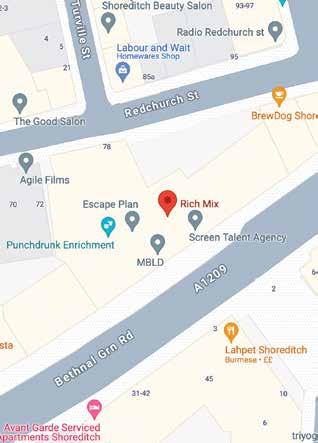
45 LOGISTICS
TNBFC would like to thank Babak Jani, Rico Johnson-Sinclair, Melanie Hoyes, Delphine Lievens, Hannah Saunders, Jennifer Sobel, Gloria Tergat, Geraldine
Moloney, Fiona Fletcher, Nicola Lees, Lauren Preteceille, Hermant Sharda, Ijeoma
Akigwe, Natalie Tandoh, Paul Bowman, Beatrice Harbour, Tomi Ojo, Azariah
Jade, Janice Turner, Anita Herbert, Mona
Tabbara, Laura Rothwell, Jasmine BernardBrooks, Sarah Edwards, Kai Williams, Yilin Chen, Toki Allison, Adam Donnelly, Devi Vanalia, Negede Assefa and the entire Rich Mix team for their stellar partnership.







Heartfelt appreciation for Andrina George, who is an absolute Queen and leader that will make you love all Black women!
Finally, TNB XPO is dedicated to all Black Sheep everywhere with woolly hair.
Editor – Priscilla Igwe
Assistant Editor – Nikki Iyayi
Sub-Editor – Toki Allison
Graphic Designer – Danielle Humphrey
Picture Researcher – Kai Williams
Writers – Nikki Iyayi, Drew Chateau, Louise Giadom, Kelechi Ehenulo, Priscilla
Igwe, Lauren Gee














46
Principal Partner
Venue Partner
Major Partner
Media Partner
SQUAD
Supporters
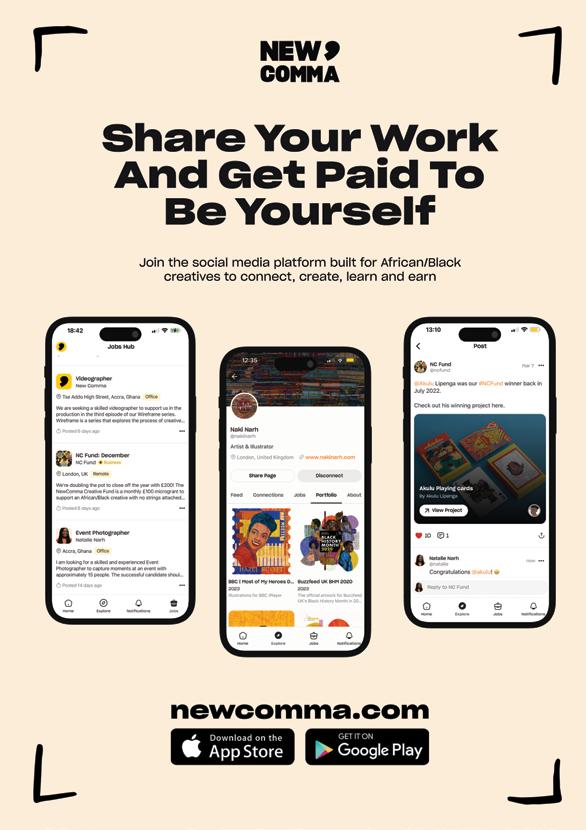
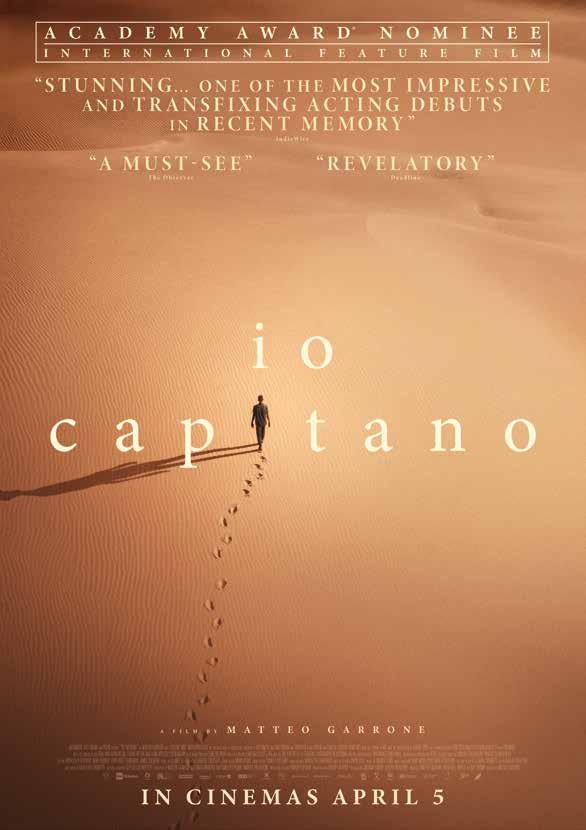




























 Billy Porter, Pose
Billy Porter, Pose


















